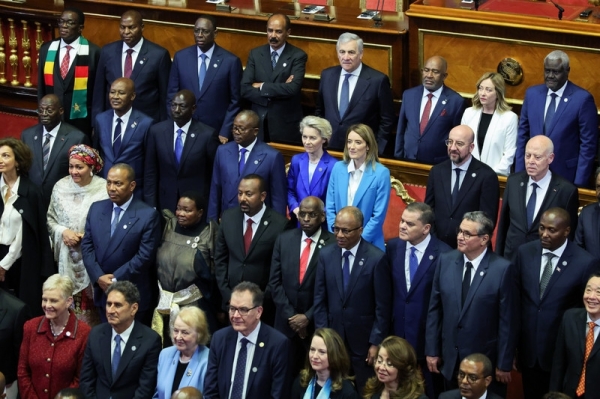Meloni offers Africa energy funding for migration control
Italian prime minister Giorgia Meloni has promised financial support to help African countries become major energy exporters — in exchange for curbing migration, at a summit in Rome on Monday (29 January).
"We believe it is possible to envision and write a new chapter in the history of our relationship, a cooperation among equals, far from any predatory imposition or charitable stance towards Africa," said Meloni, at she outlined her government’s blueprint for Italy-Africa cooperation, called A Bridge for Common Growth.
The summit in Rome, which was attended by 25 African leaders, as well as the presidents of the European Commission, Council and Parliament, Ursula von der Leyen, Charles Michel and Roberta Metsola, respectively, marks Italy’s first attempt to establish itself as one of Europe’s main players on EU-Africa policy.
The initiative would be backed by almost €6bn composed of loans and Italian government development spending.
After her nationalist Fratelli d’Italia party topped the polls in September 2022, Meloni’s conservative government prioritised migration control, although migration to Italy from Africa across the Mediterranean Sea has actually increased since she took office.
Meloni has also been at the heart of the EU’s efforts to broker ‘cash for migrant control’ deals with Tunisia and Egypt.
The Meloni government’s so-called ‘Mattei plan’, named after Enrico Mattei, the founder of Italian oil and gas giant Eni, main focus is to address the root economic causes of mass migration from Africa and on energy cooperation with African countries.
"We want to free up African energy to guarantee younger generations a right, which to date has been denied," Meloni told the summit in an opening address. "Because here in Europe we talk a lot about the right to emigrate, but we rarely talk about guaranteeing the right to not be forced to emigrate."
Following Russia’s invasion of Ukraine, Italy overhauled its gas supplies to increase supply from Algeria, Libya and Egypt. Officials say that Italy wants to set itself up as a gatekeeper for North African oil and gas being exported to Europe.
At the summit, Meloni said that Italy would finance projects to help enable Africa to become a major exporter of energy to Europe.
That message is likely to be well received by oil and gas-producing North African states and the likes of Nigeria and Ghana who are keen to increase their fossil fuel exports to Europe as well as states wanting to focus on renewables.
"I firmly believe that no African country can be asked to halt the exploration of its natural resources, including fossil fuels. But that does not mean that it makes economic sense to build a dependency on fossil fuels in our economies," said Kenya’s president William Ruto, whose aides briefed that he would seek investment for renewable energy projects at the summit.
"We need to pass from words to deeds," Moussa Faki Mahamat, the chair of the African Union commission and a former prime minister of Chad, told the summit. "We cannot be happy with promises that are never maintained."
The Meloni government has briefed that it wants to make African development a central theme as part of its G7 presidency this year.

